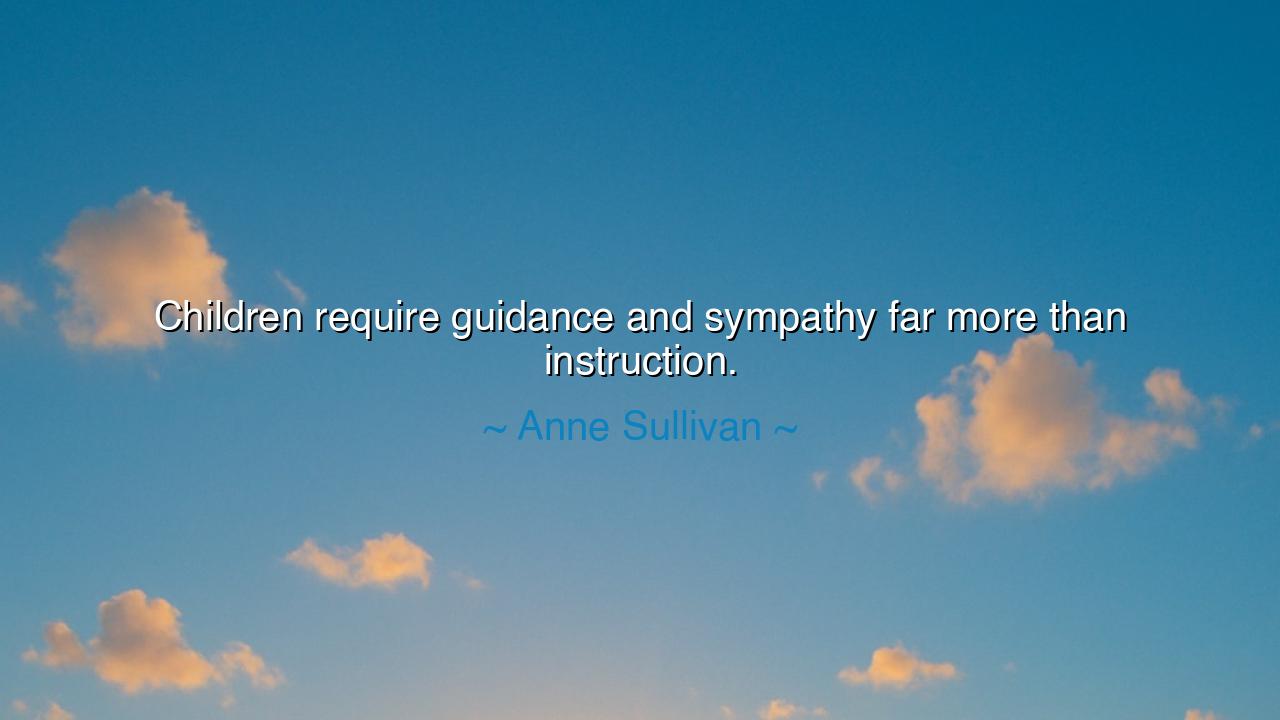
Children require guidance and sympathy far more than






When Anne Sullivan declared, “Children require guidance and sympathy far more than instruction,” she spoke not only as a teacher, but as one who had touched the very soul of a child and seen how the human spirit blossoms. These are words born of love, patience, and long struggle, for Sullivan was no ordinary instructor—she was the companion and guide of Helen Keller, a girl blind and deaf from infancy who nevertheless grew to greatness under Sullivan’s care. Her words reveal the truth that knowledge alone is a barren thing; it must be planted in the soil of guidance and sympathy before it can grow into wisdom.
The origin of this wisdom lies in Sullivan’s own life. She herself had known hardship, having been nearly blind as a child and raised in poverty. When she came to Helen Keller, she did not stand before her as a cold instructor, but as a fellow sufferer who understood what it meant to feel isolated and misunderstood. This is why she could say that children need more than instruction. Instruction fills the mind; guidance shapes the heart; sympathy touches the soul. Without these, teaching is empty.
Consider the transformation of Helen Keller. At first, she raged like a wild creature, trapped in silence and darkness. Words alone could not reach her. What reached her was Sullivan’s patience, her tireless sympathy, her unyielding faith that within the child burned a mind and a soul waiting to be freed. It was not mere instruction that opened Helen’s world, but the gentle yet firm guidance of one who loved her enough to persist. And in time, the girl who could neither hear nor see learned not only to speak, but to inspire millions with her courage and intellect. This miracle was the fruit of Sullivan’s philosophy.
The meaning of her words, then, stretches beyond the classroom. Children—and indeed, all people—thirst not merely for lessons, but for the presence of those who care. Too often, society imagines that instruction alone can shape a life. But a child taught without sympathy may grow clever yet cold, knowledgeable yet lost. It is guidance—steady hands showing the way, kind voices giving courage—that allows instruction to take root. Sympathy does what rules and lectures cannot: it awakens trust, softens fear, and calls forth the best within.
History echoes this truth in many examples. Think of Aristotle and Alexander the Great. Aristotle did not merely instruct Alexander in philosophy; he guided him, awakening in him the vision that a ruler must be more than a conqueror, that he must be steward of culture and learning. The bond between teacher and pupil was not only intellectual but moral, infused with sympathy for the burden Alexander would one day bear. So too did Sullivan show that true teaching is not the transfer of knowledge, but the shaping of destiny through love and example.
The lesson for us is clear: whether we are parents, teachers, leaders, or simply companions to the young, we must remember that words alone are not enough. Children are tender spirits, easily wounded, easily misled. What they need most is not lectures but examples, not commands but compassion. To guide with sympathy is to walk beside them, showing through patience and love how they may grow strong, wise, and kind.
What, then, should you do? First, if you are entrusted with a child, give them not only instruction but your heart. Second, be patient with their failures, remembering that guidance is more powerful than punishment. Third, offer sympathy—not indulgence, but understanding—so that they may feel safe to stumble, to learn, and to rise again. Finally, let your own life be the lesson, for children learn most from what they see lived before them.
Thus, let Sullivan’s words be remembered: “Children require guidance and sympathy far more than instruction.” This is no mere maxim of education, but a law of humanity. For we are all children in some measure, and what raises us to greatness is not only what we are taught, but the compassion and example of those who guide us with love. And when we, in turn, become guides, let us lead with hearts as well as with minds, for that is how lives are truly transformed.






AAdministratorAdministrator
Welcome, honored guests. Please leave a comment, we will respond soon